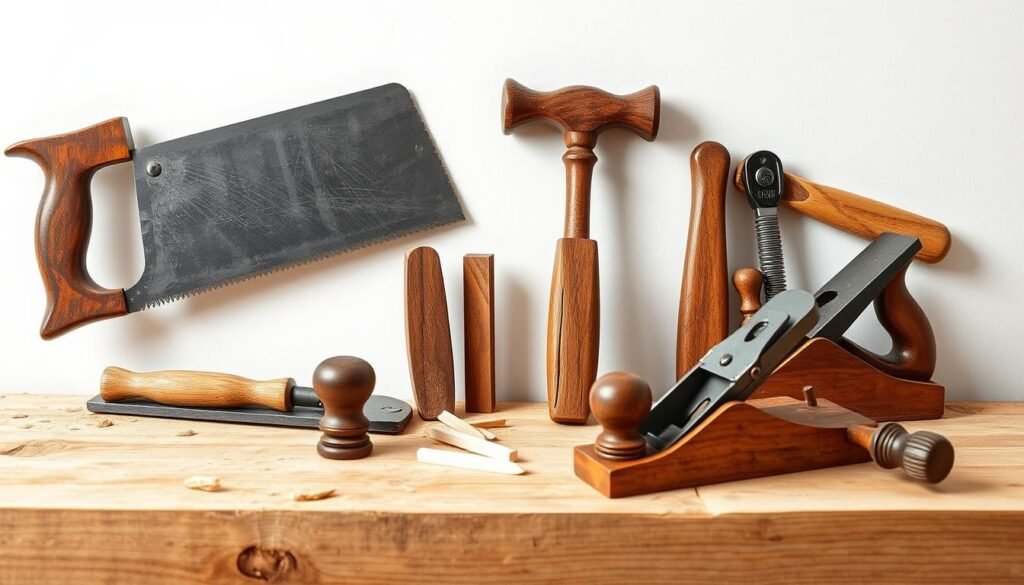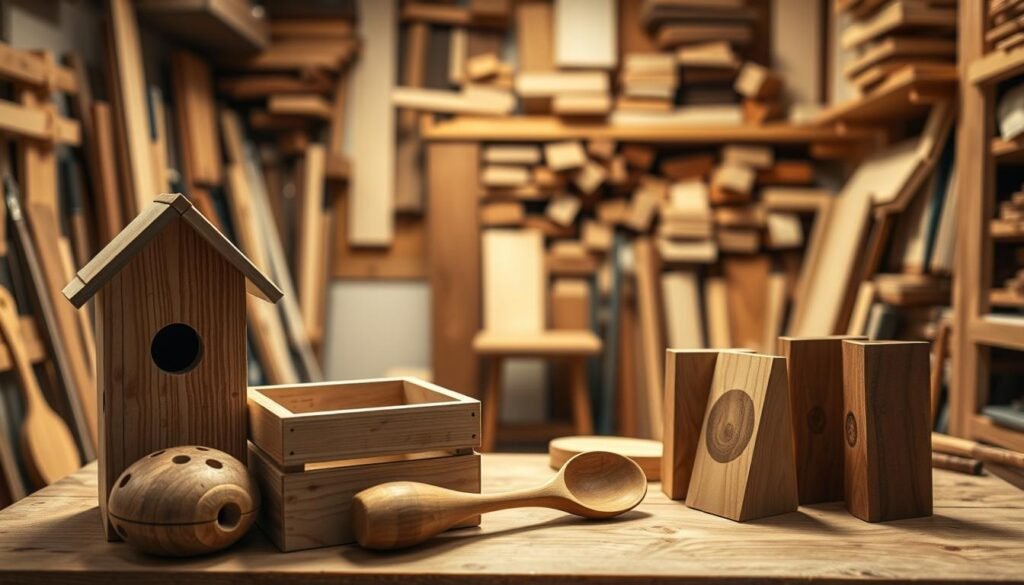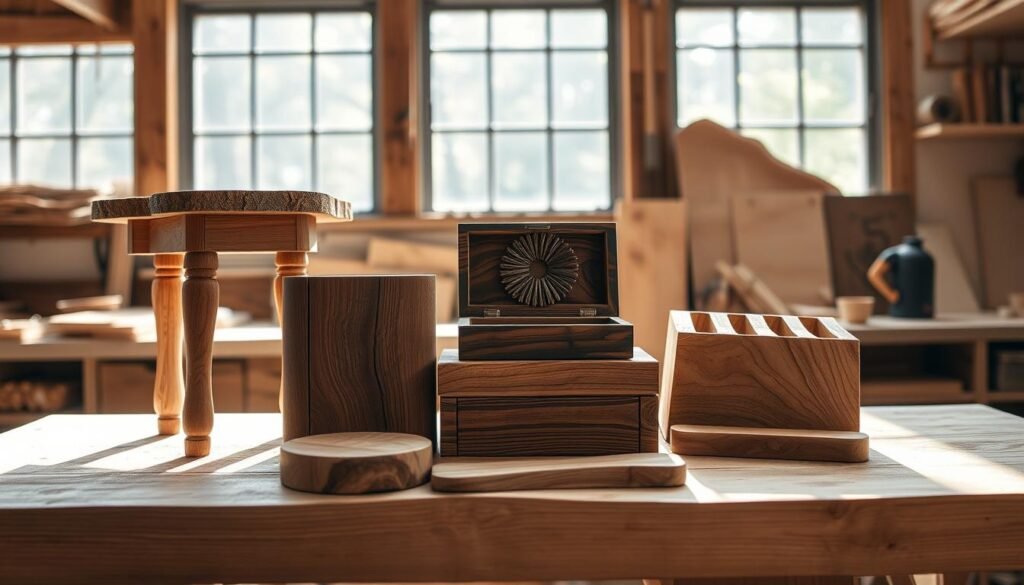Woodworking projects can make your home look and feel better. They let you save money and increase your home’s value. If you’re new to woodworking, there are many beginner plans to try. Projects like raised garden beds and picnic tables are great for beginners.
Woodworking projects can be simple or complex, depending on your skill. You can make everything from closet organizers to Adirondack chairs. Whether you want to improve your bedroom or create an outdoor kitchen, woodworking can help. With the right tools and plans, you can make something beautiful and useful that shows off your style.
Woodworking offers endless possibilities. You can make a custom coffee table, a wine rack, or even a picture frame. With creativity and the right materials, you can turn your ideas into reality. Whether you’re just starting or have lots of experience, woodworking is always exciting. It’s a fun way to express your creativity and make something special.
Key Takeaways
- Woodworking projects can enhance your home’s aesthetic and functionality while expressing your creativity
- Beginner woodworking plans are a great starting point for those new to woodworking
- Popular projects like raised garden beds and picnic tables are perfect for DIY woodworking
- A woodworking project can be a fun and rewarding experience, allowing you to create something unique and personalized
- With the right tools and materials, you can create a beautiful and functional piece of furniture or decor that reflects your personal style
- Woodworking projects can range from simple to complex, depending on your skill level and interests
Essential Tools for Your Woodworking Project Journey
Starting your woodworking journey? The right tools are key to making your ideas real. Whether you’re new or experienced, quality tools greatly improve your projects. Woodworking tutorials stress the need for the right tools and how to keep them in good shape.
Having a full toolkit is vital. You’ll need basic hand tools like chisels and mallets. Also, power tools such as miter saws and drill presses are important. The right tools help you work efficiently and safely.

Beginners should start with a tape measure, carpenter square, and pencils. These help with marking cuts and measurements. As you get better, you might want specialized tools like routers and band saws. Always follow safety rules when using power tools and sharp objects.
Looking to get better? There are many online tutorials and classes. They offer great tips and guidance. With the right tools, techniques, and safety, you’ll make beautiful woodworking projects you can be proud of.
Understanding Different Types of Wood and Their Uses
Choosing the right wood is key for woodworking projects for beginners. Each type of wood has its own strengths and uses. Hardwoods, for example, are denser and better for woodworking plans for furniture.
Oak, maple, and cherry are popular woods. Oak is great for floors and outdoor use because it resists rot. Maple is strong and good for butcher blocks. Cherry is a high-end wood with a rich color and a higher price tag.
Here are some key characteristics of different types of wood:
- Oak: resistant to rot and decay
- Maple: strong and durable
- Cherry: premium hardwood with rich color
- Pine: softwood with color variance, suitable for diverse applications
- Cedar: known for its decay resistance, commonly used in outdoor construction
For woodworking projects for beginners, picking the right wood is crucial. With the right wood and woodworking plans for furniture, beginners can make beautiful and useful pieces.

| Type of Wood | Characteristics | Uses |
|---|---|---|
| Oak | Resistant to rot and decay | Flooring, outdoor applications |
| Maple | Strong and durable | Butcher blocks, musical instruments |
| Cherry | Premium hardwood with rich color | Furniture, wood carvings |
Beginner-Friendly Woodworking Projects to Start With
Starting with woodworking can seem daunting, but it’s easier than you think. Easy woodworking projects are perfect for beginners. They help build confidence and skills. Projects like simple storage, decorative items, and basic furniture are great for beginners.
These projects are great for beginners because they’re not too hard. You don’t need many tools or materials. For example, a simple wooden bench can be made with just two boards and 18 screws. It’s a quick and affordable project.
Other beginner-friendly projects include a coat rack, spice rack, or a step stool. These projects help you practice basic skills like measuring and cutting. They also give you a sense of accomplishment and are useful in daily life.
| Project | Materials Needed | Time Required |
|---|---|---|
| Simple Coat Rack | 1×4 board, hooks | 1 hour |
| Spice Rack | Wooden discs, dowels | 1.5 hours |
| Step Stool | 2×4 boards, screws | 2 hours |
With these beginner-friendly projects, anyone can start woodworking and improve their skills. Always follow safety rules and use the right techniques for a successful project.
Advanced Woodworking Project Ideas for Experienced Crafters
Experienced crafters can try advanced woodworking project ideas. These projects need special tools and techniques. A diy woodworking project like a pedestal dining room table is a good choice. It costs about $100 and helps improve your skills.
Building a kitchen island is a big challenge that takes days. It needs base cabinets and lots of skill, time, and effort. But, a beginner woodworking plans project like a picnic table can be done in hours. It’s perfect for starting with something simple.
For advanced projects, you’ll need tools like a compound miter saw and a table saw. You’ll also need a router, drill press, belt sander, and jigsaw. Learning the mortise and tenon joint is key. It’s a joint woodworkers use a lot. With practice, you can make beautiful diy woodworking projects.
Trying harder projects can make you better at woodworking. You can make useful furniture like a pedestal dining room table or a kitchen island. Advanced woodworking project ideas help you grow and create something special.
Creating Custom Furniture: From Design to Completion
Creating custom furniture needs the right woodworking ideas and woodworking tips. Online woodworking tutorials can teach you to make furniture that looks professional. For example, a kitchen step stool project uses a router and template for the sides, perfect for those with experience.
Before starting, plan your furniture project well. Think about the size, design, and materials. This ensures your furniture meets your needs and looks great.
Planning Your Furniture Project
- Choose the right type of wood for your project
- Consider the intended use of the furniture piece
- Measure the space where the furniture will be placed
By following these tips and using online woodworking tutorials, you can make custom furniture that’s both useful and beautiful. Always use proper woodworking tips and techniques for the best results.
Joinery Techniques for Furniture Making
Joinery techniques are key in furniture making. You can choose from many methods like mortise and tenon, dovetail, and dado. Learning these techniques helps you make strong, lasting joints.
| Joinery Technique | Description |
|---|---|
| Mortise and Tenon | A traditional joinery technique used to connect two pieces of wood |
| Dovetail | A strong and durable joinery technique used to connect two pieces of wood at a 90-degree angle |
| Dado | A joinery technique used to connect two pieces of wood at a 90-degree angle, often used in shelving and cabinetry |
Using the right joinery techniques and following woodworking tips helps you create beautiful, functional furniture. With time and effort, you can become skilled at making furniture that will be treasured for years.
Essential Woodworking Tips and Techniques
For beginners in woodworking projects, mastering certain skills is key. Measuring, cutting, and assembling are crucial. These skills help you complete woodworking plans for furniture safely and well.
Using the right tools is a vital tip for beginners. For instance, a quick blade-height gauge saves time and boosts accuracy. Also, painter’s tape can help with gluing, making sanding and finishing easier.
Other important tips and techniques include:
- Using quarter-sawn boards for better stability and looks
- Adding vinegar to wood glue for better use
- Using a hacksaw blade attachment for cutting sandpaper efficiently
Remember, safety is paramount when starting woodworking projects. Always wear safety glasses, hearing protection, and dust masks. By following these tips, beginners can enhance their skills and confidently complete woodworking plans for furniture.
With dedication and patience, anyone can master woodworking. Whether you’re new or experienced, having the right skills is crucial for success.
| Tips and Techniques | Benefits |
|---|---|
| Using quarter-sawn boards | Enhanced stability and aesthetic appeal |
| Adding vinegar to wood glue | Improved usability and extended shelf-life |
| Using a hacksaw blade attachment | Increased efficiency and reduced tool wear |
Outdoor Woodworking Projects for Your Garden
Outdoor woodworking projects are a fantastic way to start if you’re new to woodworking. They let you create beautiful pieces for your garden. A popular choice is a pallet side table, made from reclaimed wood and weather-resistant materials.
Other great ideas include:
- Building a garden bench or planter box
- Creating a wooden pathway or trellis
- Making a birdhouse or bird feeder
These projects are great for beginners. They need only a few tools and materials and can be finished quickly.
You can also think about making a wooden swing or outdoor dining table. These projects are a bit harder but add a lot of value to your garden. With the right plans and materials, you can make pieces that will last for many years.
| Project | Difficulty Level | Time Required |
|---|---|---|
| Pallet side table | Easy | 1-2 hours |
| Garden bench | Medium | 2-3 hours |
| Wooden swing | Hard | 4-5 hours |
Small Space Woodworking: Making the Most of Limited Area
Many woodworking fans face the challenge of a small workspace. You might be in a single car garage, a shed, or a spare room. But, you can still complete a woodworking project with the right tools and planning. A simple laptop computer stand is a great diy woodworking project for beginners. It needs only a few tools and materials.
In a small space, it’s key to optimize your area and tools. Using clamps in the same direction can save space. Foldable workstations, like Workmate®, are perfect for beginner woodworking plans in tight spots. They allow for easy storage. Tools that do more than one thing, like a combination gauge, also help save space.
- Use wall storage to provide 3-4 times the available storage area compared to floor space
- Choose shallow wall storage that projects no more than a couple of inches from the wall
- Utilize overhead or high wall storage for small containers and lumber
By using these tips, you can set up a productive small space for woodworking. It’s ideal for your next woodworking project.
Sustainable Woodworking Practices and Eco-Friendly Projects
Woodworkers play a big role in protecting our planet. By using eco-friendly methods, we can greatly reduce waste. Using reclaimed wood is a great start, as it cuts down new timber use by up to 50% in some projects.
It’s also important to think about where our materials come from. The Forest Stewardship Council (FSC) says about 30% of the world’s forests are managed well. Choosing materials from these sources helps protect forests and wildlife. Plus, buying local timber cuts down on carbon emissions and boosts local economies.
Here are some sustainable woodworking tips:
- Design projects to use less material and waste less
- Choose non-toxic finishes to improve indoor air quality
- Turn wood shavings and sawdust into compost to avoid landfills
- Work with local sawmills and suppliers to lower emissions
By following these tips, we can make beautiful items that are good for the planet. As we learn more about woodworking, let’s focus on being green. This way, we can make a big difference for our environment.
| Sustainable Practice | Environmental Benefit |
|---|---|
| Using reclaimed wood | Reduces demand for new timber by up to 50% |
| Implementing efficient design practices | Reduces material waste by up to 20-30% |
| Using non-toxic finishes | Lowers indoor air pollution by up to 50% |
Cost-Effective Workshop Setup and Organization
Setting up a workshop for woodworking projects for beginners requires careful planning. A well-organized space can boost your productivity by up to 50%. This means you can spend more time on your projects.
To create a cost-effective workshop, start with a functional workbench. A good workbench is about 6 feet long and 2 feet deep. It should also be at a height that keeps your wrists straight, preventing strain.
Here are some key points for a cost-effective workshop setup:
- Task lighting and overhead LED lighting to improve visibility and reduce accidents
- Ergonomic tools and mats to decrease the risk of fatigue during longer woodworking sessions
- A well-organized storage system to free up 15-20% more workspace in a small workshop
- Rolling tool cabinets to increase efficiency and allow quick access to tools
Adding safety features like dust collection systems is also important. They can cut down on respiratory issues and accidents by over 40%. A good dust collection system can be bought for under $1,000, making it a worthwhile investment.
By using these tips and woodworking projects for beginners and woodworking plans for furniture, you can set up a workshop that’s both cost-effective and efficient. This will help you meet your woodworking goals.
| Workshop Size | Minimum Recommended Area | Ideal Size |
|---|---|---|
| Small Workshop | 75 square feet | 125 square feet |
Conclusion: Embarking on Your Woodworking Journey
Woodworking offers a world full of possibilities, from simple projects for beginners to complex furniture for experts. It’s all about enjoying the journey, no matter where you start.
Woodworking has a long history, dating back to ancient Egypt around 3000 BC. Today, it combines old tools with new technology. This lets both hobbyists and pros turn their ideas into reality.
Begin by starting small and mastering the basics. Then, move on to more challenging projects. The joy of making something with your hands is unmatched. You’ll learn skills that can help with many projects at home. So, get your tools ready, pick a plan, and let your creativity soar. The future is bright!

